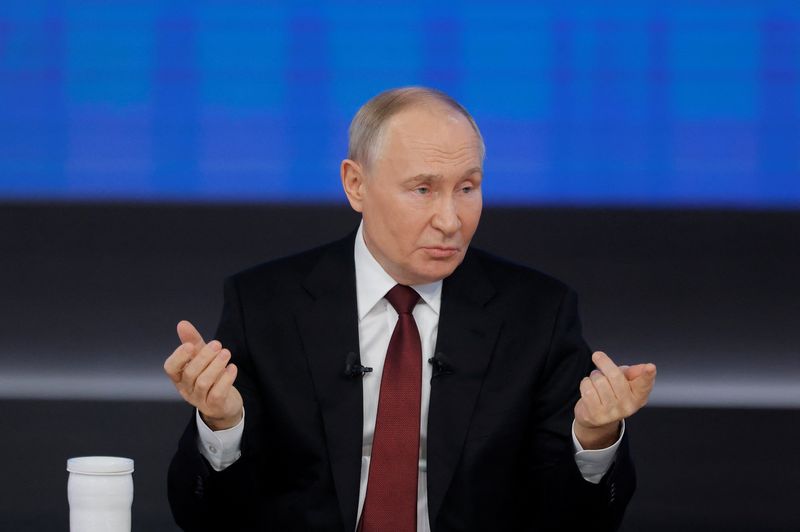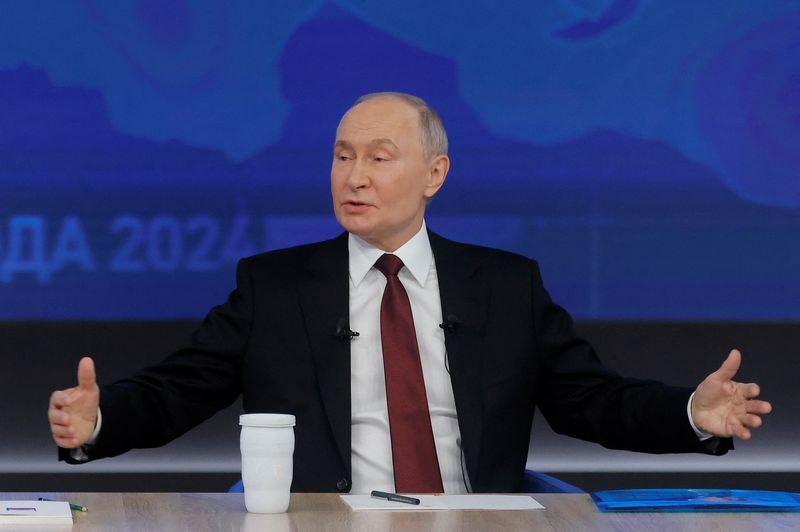By Vladimir Soldatkin and Andrew Osborn
MOSCOW (Reuters) -Russian President Vladimir Putin said on Thursday that he was ready to compromise over Ukraine in possible talks with U.S. President-elect Donald Trump on ending the war and had no conditions for starting talks with the Ukrainian authorities.
Trump, a self-styled master of brokering agreements and author of the 1987 book "Trump: the Art of the Deal", has vowed to swiftly end the conflict, but has not yet given any details on how he might achieve that.
Putin, fielding questions on state TV during his annual question and answer session with Russians, told a reporter for a U.S. news channel that he was ready to meet Trump, whom he said he had not spoken to for years.
Asked what he might be able to offer Trump, Putin dismissed an assertion that Russia was in a weak position, saying that Russia had got much stronger since he ordered troops into Ukraine in 2022.
"We have always said that we are ready for negotiations and compromises," Putin said, after saying that Russian forces, advancing across the entire front, were moving towards achieving their primary goals in Ukraine.
"Soon, those Ukrainians who want to fight will run out, in my opinion, soon there will be no one left who wants to fight. We are ready, but the other side needs to be ready for both negotiations and compromises."
Reuters reported last month that Putin was open to discussing a Ukraine ceasefire deal with Trump, but ruled out making any major territorial concessions and insisted Kyiv abandon its ambitions to join NATO.
Putin said on Thursday that Russia had no conditions to start talks with Ukraine and was ready to negotiate with anyone, including President Volodymyr Zelenskiy.
But he said any deal could only be signed with Ukraine's legitimate authorities, which for now the Kremlin considered to be only the Ukrainian parliament.
Zelenskiy, whose term was due to expire earlier this year but has been extended due to martial law, would need to be re-elected for Moscow to consider him a legitimate signatory to any deal to ensure it was legally watertight, said Putin.
Putin dismissed the idea of agreeing a temporary truce with Kyiv, saying only a long-lasting peace deal with Ukraine would suffice.
Any talks should take as their starting point a preliminary agreement reached between Russian and Ukrainian negotiators in the early weeks of the war at talks in Istanbul, which was never implemented, he added.
Some Ukrainian politicians regard that draft deal as akin to a capitulation which would have neutered Ukraine's military and political ambitions.
WAR
Russia's 2022 invasion of Ukraine has left tens of thousands of dead, displaced millions and triggered the biggest crisis in relations between Moscow and the West since the 1962 Cuban Missile Crisis.
Russia, which casts the conflict as a defensive special military operation designed to stop dangerous NATO expansion to the east, controls around a fifth of Ukraine and has taken several thousand square kilometres of territory this year.
Determined to incorporate four Ukrainian regions into Russia, Moscow's forces have taken village after village in the east and are now threatening strategically important cities such as Pokrovsk, a major road and rail hub.
Putin said the fighting was complex, so it was "difficult and pointless to guess what lies ahead... (but) we are moving, as you said, towards solving our primary tasks, which we outlined at the beginning of the special military operation."
Discussing the continued presence of Ukrainian forces in Russia's Kursk region, Putin said Kyiv's troops would be forced out, but declined to say exactly when that would happen.
The war has transformed the Russian economy and Putin said it was showing signs of overheating which was stoking worryingly high inflation. But he said growth was higher than many other economies such as Britain.
Asked if he'd do anything differently, he said he should have sent troops into Ukraine sooner than 2022 and that Russia should have been better prepared for the conflict.
Asked by a BBC reporter if he'd looked after Russia, something that Boris Yeltsin had asked him to do before handing over the presidency at the end of 1999, Putin said he had.
"We have moved back from the edge of the abyss," Putin said.
"I have done everything to ensure that Russia is an independent and sovereign power that is able to make decisions in its own interests."
Russia, Putin said, had made proposals to Syria's new rulers about Russia's military bases there and most people that Moscow had spoken to on the issue favoured them staying.
Russia would need to think about whether the bases should remain or not, he added, but rumours about the death of Russian influence in the Middle East were exaggerated.

Putin touted what he said was the invincibility of the "Oreshnik" hypersonic missile that Russia has already test-fired at a Ukrainian military factory, saying he was ready to organise another launch at Ukraine and see if Western air defence systems could shoot it down.
In Brussels, Zelenskiy addressed Putin's missile suggestion during a press conference at a European Council meeting, remarking of Putin: "Do you think he is a sane person?"
